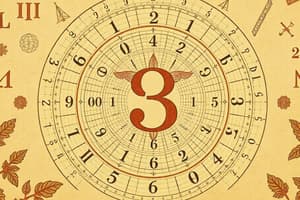Podcast
Questions and Answers
Which of the following is NOT a fundamental operation in arithmetic?
Which of the following is NOT a fundamental operation in arithmetic?
- Exponentiation (correct)
- Multiplication
- Subtraction
- Addition
What is the primary focus of differential calculus?
What is the primary focus of differential calculus?
- Studying rates of change (correct)
- Solving quadratic equations
- Finding areas under curves
- Calculating probabilities
Which property states that changing the order of the numbers in an operation does not change the result?
Which property states that changing the order of the numbers in an operation does not change the result?
- Associativity
- Identity
- Distributivity
- Commutativity (correct)
In geometry, which theorem relates the lengths of the sides of a right triangle?
In geometry, which theorem relates the lengths of the sides of a right triangle?
What does the term 'central tendency' refer to in statistics?
What does the term 'central tendency' refer to in statistics?
Which of the following operations on sets includes only the elements that are in both sets?
Which of the following operations on sets includes only the elements that are in both sets?
Which of the following is NOT typically a part of algebra?
Which of the following is NOT typically a part of algebra?
What is one of the essential skills in working with fractions?
What is one of the essential skills in working with fractions?
Flashcards
What is Arithmetic?
What is Arithmetic?
The study of basic numerical operations, including addition, subtraction, multiplication, and division, involving integers, fractions, decimals, and percentages.
What is Algebra?
What is Algebra?
Using variables to represent unknown quantities and solving equations, including simplifying expressions, solving linear and quadratic equations, and working with inequalities.
What is Geometry?
What is Geometry?
The branch of mathematics that deals with shapes, sizes, and properties of space, including concepts like angles, lines, triangles, and circles.
What is Calculus?
What is Calculus?
Signup and view all the flashcards
What is Statistics?
What is Statistics?
Signup and view all the flashcards
What is a Set?
What is a Set?
Signup and view all the flashcards
What are the Properties of Arithmetic Operations?
What are the Properties of Arithmetic Operations?
Signup and view all the flashcards
What is the Order of Operations?
What is the Order of Operations?
Signup and view all the flashcards
Study Notes
Fundamental Concepts
- Mathematics is a formal system of logic and abstract thought used to quantify and model the world.
- It encompasses various branches, such as arithmetic, algebra, geometry, calculus, and statistics.
- Fundamental operations include addition, subtraction, multiplication, and division, which form the building blocks for more complex calculations.
Arithmetic
- Arithmetic deals with basic numerical operations.
- It involves integers, rational numbers, and irrational numbers.
- Properties like commutativity, associativity, and distributivity are crucial for simplifying calculations.
- Working with fractions, decimals, and percentages are essential skills.
- Order of operations (PEMDAS/BODMAS) is fundamental for evaluating multi-step expressions.
Algebra
- Algebra uses variables to represent unknown quantities and solve equations.
- It involves simplifying expressions, solving linear and quadratic equations, and working with inequalities.
- Factoring and expanding expressions are common algebraic manipulations.
- Graphing linear equations in the Cartesian plane is important for visualizing relationships.
- Exponents, radicals, and logarithms are necessary for handling more complex expressions.
Geometry
- Geometry deals with shapes, sizes, and properties of space.
- Euclidean geometry focuses on two- and three-dimensional figures.
- Concepts like angles, lines, triangles, quadrilaterals, circles, and volumes are central to understanding geometry.
- Pythagorean theorem, area formulas, and circumference calculations are vital tools.
Calculus
- Calculus involves the study of continuous change.
- Differential calculus focuses on rates of change (derivatives).
- Integral calculus deals with accumulation of quantities (integrals).
- Applications include finding slopes of curves, areas under curves, and optimization problems.
Statistics
- Statistics deals with data collection, analysis, and interpretation.
- It involves measures of central tendency (mean, median, mode) and dispersion (variance, standard deviation).
- Techniques like probability, sampling, and hypothesis testing are used to draw conclusions from data.
- Visual representations of data like histograms and scatter plots are important for data analysis.
Set Theory
- Set theory is a branch of mathematics that studies sets, which are collections of objects.
- It defines operations on sets such as union, intersection, and complement.
- Understanding sets and their relationships forms a basis for many areas of mathematics.
Logic
- Logic is used to develop sound reasoning and arguments.
- Mathematical proofs often use logical steps to establish truths.
Studying That Suits You
Use AI to generate personalized quizzes and flashcards to suit your learning preferences.
Description
Explore the essential branches of mathematics, focusing on arithmetic and algebra. This quiz covers basic numerical operations, properties of numbers, and techniques for solving equations. Test your understanding of fundamental mathematical concepts.




